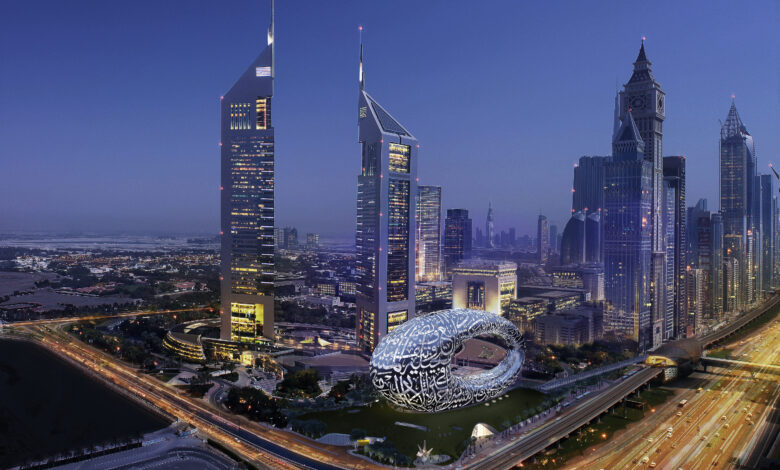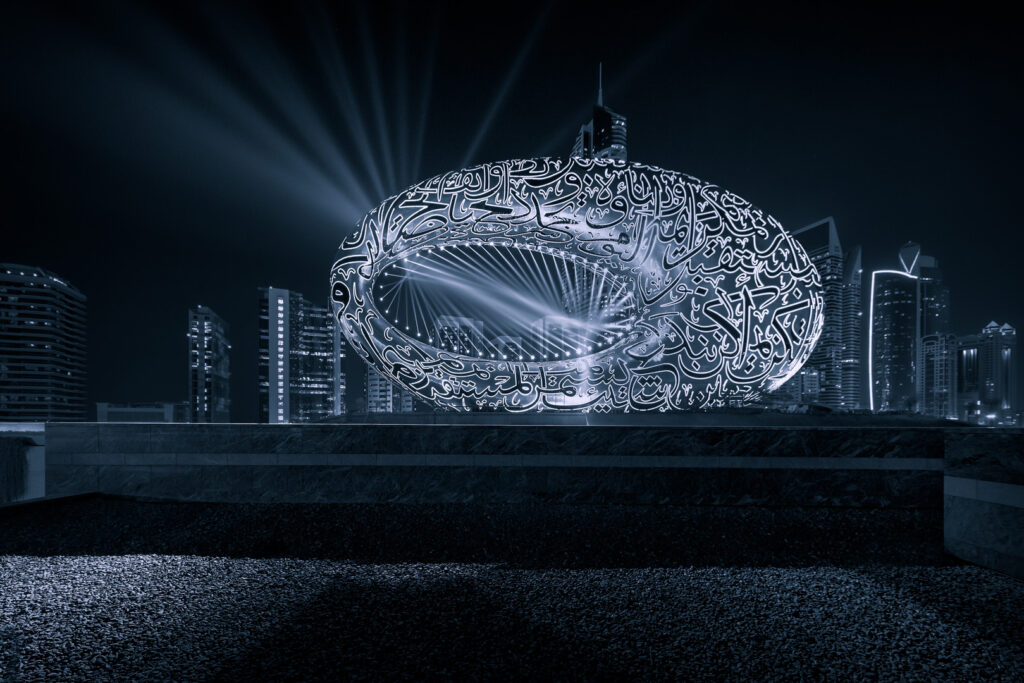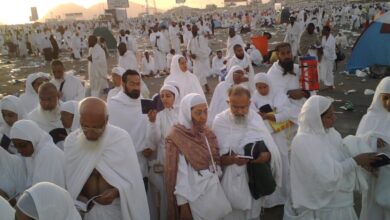
Mohammed bin Rashid inaugurates the Museum of the Future
His Highness Sheikh Mohammed bin Rashid Al Maktoum, Vice President and Prime Minister of the UAE and Ruler of Dubai, today inaugurated the Museum of the Future, as Dubai’s new iconic landmark officially opened its doors to the world with a new message of hope for all humankind.
The 77-metre tall architectural marvel will provide the largest platform in the region to study, envision and design the future. It is a novel scientific and intellectual centre where the brightest talents in the fields of science, technology, research and innovation will converge to discover solutions to tomorrow’s world.
During the opening ceremony, His Highness Sheikh Mohammed said: “The Museum of the Future is a message of hope … a global scientific platform … and an integrated institutional framework to shape a better future for all of us.”
His Highness continued: “It embodies the active human imagination and the Emirati will that continues to excel the world. The Museum will be a forum for great minds, scientists, thinkers and experts from around the world.”
H.H. Sheikh Hamdan bin Mohammed bin Rashid Al Maktoum, Crown Prince of Dubai and Chairman of the Board of Trustees at Dubai Future Foundation, said: “The Museum of the Future will be an intellectual laboratory for cities of the future and governments of the future … it will play a key role in strengthening Dubai’s future position. The Museum will provide a clear roadmap for Dubai’s vital sectors.”
H.H. Sheikh Maktoum bin Mohammed bin Rashid Al Maktoum, Deputy Ruler of Dubai, Deputy Prime Minister and Minister of Finance, said: “Through the Museum of the Future, His Highness Sheikh Mohammed bin Rashid Al Maktoum aims to instutionalise future foresight and explore its opportunities to enhance the nation’s competitiveness.”
Sheikh Maktoum added: “We seek to accelerate the transition towards a knowledge-based economy in the region and explore practical scientific solutions to the greatest challenges of our times, both today and tomorrow.”

Commenting on the opening of the landmark, Mohammed Abdullah Al Gergawi, Chairman of the Museum of the Future, highlighted the resemblance between the philosophy of His Highness Sheikh Mohammed bin Rashid Al Maktoum and the Museum of the Future. He said: “In its continuously evolving and renewed concept, the Museum of the Future reflects the resilient and agile vision of His Highness Sheikh Mohammed bin Rashid in responding to changes of the future.”
The opening ceremony featured several videos highlighting the concept of the Museum of the Future and the vision of His Highness Sheikh Mohammed bin Rashid Al Maktoum to transform Dubai into the most developed city in the world.
Attending the opening ceremony of the iconic landmark in Dubai were H.H. Sheikh Ahmed bin Saeed Al Maktoum, President of the Dubai Civil Aviation Authority, Chairman of Dubai Airports and Chairman and Chief Executive of Emirates Airline and Group; H.H. Sheikh Mansoor bin Mohammed bin Rashid Al Maktoum, Chairman of the Dubai Sports Council; H.H. Sheikha Latifa bint Mohammed bin Rashid Al Maktoum, Chairperson of the Dubai Culture and Arts Authority; and a number of ministers and officials of government departments in Dubai.
Unfolding futuristic exhibitions, the Museum of the Future is a remarkable addition to the world’s most important landmarks and icons. It is considered an unparalleled architectural masterpiece thanks to its pioneering engineering design that stands ahead of its time.
It will also be an incubator for global talents, scientists, thinkers and researchers, to bring their bold ideas and visions of the future to life. The Museum will launch new initiatives in the fields of science and technology to strengthen the UAE’s knowledge-base to further accelerate scientific development.
From an architectural perspective, the museum is an engineering marvel. It is the most streamlined building in the world with no sharp corners on its external structure. It rises to a height of 77 metres and redefines modern architecture through the use of novel tools and technologies.
The museum is considered one of the most complex architectural projects in the world. It was constructed using the “parametric design” model, a three-dimensional technology based on advanced technical design that works by entering data and parameters for the building to be designed.
The stainless-steel facade of the museum consists of 1,024 panels over an area of 17,600 square meters. The facade panels were produced using automated robotic arms in a first in the region, with each panel consisting of 4 layers, and requiring a 16-step process to produce. Each panel was installed individually, with the installation period for the external facade lasting more than 18 months.
The museum is accessed via two bridges, the first of which extends to the buildings of Jumeirah Emirates Towers with a length of 69 metres, and the second connects it to the Emirates Towers metro station with a length of 212 metres. The museum is fed with 4,000 megawatts of electricity that is produced through solar energy using solar panels connected to the museum.
The facade of the Museum of the Future is illuminated by 14,000 metres of light lines and is decorated with inspirational quotes from His Highness Sheikh Mohammed’s poetry in Arabic calligraphy, making it the only building in the world whose entire façade is adorned using the art of calligraphy. The engraved writing on the steel facade is designed using advanced glass manufactured with new technologies specifically to improve the quality of interior lighting and exterior thermal insulation.
The Emirati artist Mattar bin Lahej designed the sayings of His Highness Sheikh Mohammed, the “Thuluth” script, reflecting nobility, originality and permanence, knowing that the script is one of the most used Arabic scripts in artistic expression due to its timeless aesthetic.
The Museum of the Future will present a clear roadmap for Dubai and the UAE’s future, through which all vital sectors stand to benefit from future economic, developmental, scientific and humanitarian opportunities.
In addition, the Museum of the Future will be a major laboratory for governmental and non-governmental entities and institutions in Dubai, as well as a factory for ideas and perspectives to understand, design and build the future.
Further, the museum aims to build a network of partnerships with major scientific and research institutions and centres in the world in order to host and promote in-depth dialogues about future trends shaping various developmental, economic, scientific, technological and humanitarian sectors.
Spanning an area of 30,000 square metres, the seven-storey pillarless structure also represents a novel global intellectual centre. It is a “living” laboratory designed to foster a spirit of collaborative innovation among leading scientists to inspire new out-of-the-box solutions to tomorrow’s greatest challenges and spur a new era of scientific discovery in the region and beyond.
The Museum of the Future seeks to lead the knowledge movement as a centre for the latest advanced scientific and technological innovations.
In addition, the Museum of the Future will connect futurists, scientists, technologists and industry leaders by holding regular forums, dialogues, seminars and research sessions throughout the year. The museum will also disseminate knowledge and research that sheds light on the most important scientific discoveries, developments and trends.
The Museum of the Future consists of three main elements: the hill or plateau from which the building rises, the external design of the building, and the exhibitions of the Museum.
The Museum employs the latest technologies in virtual and augmented reality, big data analysis, artificial intelligence and human machine interaction to answer many questions related to the future of humanity, cities, societies and life on Earth, all the way to outer space.
The Museum of the Future features a multi-use hall that accommodates more than 1,000 people, and its sections include a special hall for interactive lectures and workshops that can accommodate more than 345 people.
It also includes innovation laboratories for health, education, smart cities, energy and transportation, a permanent museum of future innovations, and laboratories to generate and test new ideas, especially in developmental areas related to critical social challenges.
The Museum of the Future takes its visitors on an experiential journey that transports them to the year 2071, which coincides with the centenary of the founding of the UAE. The journey takes visitors from a universal to a personal realm, based on an approach that emphasises the importance of one’s connection to the universe within the framework of a relationship of mutual influence, and promotes the principle of each individual’s role in shaping the future.
Source: Wam.ae




